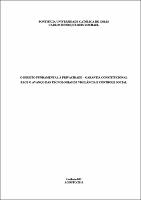| Compartilhamento |


|
Use este identificador para citar ou linkar para este item:
http://tede2.pucgoias.edu.br:8080/handle/tede/2773Registro completo de metadados
| Campo DC | Valor | Idioma |
|---|---|---|
| dc.creator | Rochael, Carlos Henrique Reis | - |
| dc.creator.Lattes | http://lattes.cnpq.br/0940878927799951 | por |
| dc.contributor.advisor1 | Costa, Eliane Romeiro | - |
| dc.contributor.advisor1Lattes | http://lattes.cnpq.br/2623543635007840 | por |
| dc.date.accessioned | 2016-08-10T10:47:55Z | - |
| dc.date.available | 2012-01-18 | - |
| dc.date.issued | 2010-09-15 | - |
| dc.identifier.citation | ROCHAEL, Carlos Henrique Reis. O DIREITO FUNDAMENTAL À PRIVACIDADE - GARANTIA CONSTITUCIONAL FACE O AVANÇO DAS TECNOLOGIAS DE VIGILÂNCIA E CONTROLE SOCIAL. 2010. 168 f. Dissertação (Mestrado em Ciências Humanas) - Pontifícia Universidade Católica de Goiás, Goiânia, 2010. | por |
| dc.identifier.uri | http://localhost:8080/tede/handle/tede/2773 | - |
| dc.description.resumo | Com a evolução da tecnologia da informação, modernas técnicas de vigilância e controle social estão sendo usadas, tanto por parte do Estado quanto por entidades privadas. Ante a isso, tem-se como objetivo, nesta dissertação, a análise do real âmbito de proteção e de garantia efetiva do direito à privacidade, conforme definido no artigo 5º, inciso X, da Constituição brasileira de 1988, sob um enfoque neoconstitucionalista. A finalidade é comprovar se o uso da tecnologia da informação no controle dos hábitos sociais é uma atividade inconstitucional, por ser aquela considerada um instrumento que viola o direito à privacidade e, consequentemente, a dignidade da pessoa humana. O método usado na pesquisa foi o hipotético-dedutivo, com auxílio dos métodos comparativos e históricos, uma vez que ela foi integralmente teórica. Ao final, os resultados mostraram que a privacidade pertence tanto ao rol de direitos humanos quanto ao dos direitos fundamentais e que a norma constitucional que define o direito à privacidade em defesa da dignidade da pessoa humana não permite restrições direta nem indiretamente constitucionais. Restrições somente são possíveis pelo sopeso, considerando se há, no caso concreto, colisão com outro princípio fundamental. Os resultados mostraram ainda que toda violação à privacidade por intermédio da tecnologia da informação é inconstitucional. | por |
| dc.description.abstract | With the evolution of information technology, modern techniques of surveillance and social control are being used by both the State and by private entities. It is the objective of this dissertation, the analysis of the real scope of protection and effective guarantee of the right to privacy as defined in Article 5, section X, of the 1988 Brazilian Constitution, from a neoconstitutionalism perspective. The purpose is to demonstrate that the use of information technology, in the control of social habits, is an unconstitutional activity for violating the right to privacy and thereby the dignity of the human person. The method used was hypothetical-deductive, with the help of comparative and historical ones. The research was entirely theoretical. In the end, it was concluded that the privacy belongs to the group of the human rights and also to the list of fundamental rights, and the constitutional standard that defines the right to privacy does not allow direct or indirect constitutional restrictions. Restrictions are only possible through poise when in collision with another fundamental principle. Any violation of privacy through information technology is unconstitutional. | eng |
| dc.description.provenance | Made available in DSpace on 2016-08-10T10:47:55Z (GMT). No. of bitstreams: 1 CARLOS HENRIQUE REIS ROCHAEL.pdf: 1548598 bytes, checksum: c4431940d6c1e7bf0f15b99959c43687 (MD5) Previous issue date: 2010-09-15 | eng |
| dc.format | application/pdf | por |
| dc.thumbnail.url | http://localhost:8080/tede/retrieve/8532/CARLOS%20HENRIQUE%20REIS%20ROCHAEL.pdf.jpg | * |
| dc.language | por | por |
| dc.publisher | Pontifícia Universidade Católica de Goiás | por |
| dc.publisher.department | Ciências Humanas | por |
| dc.publisher.country | BR | por |
| dc.publisher.initials | PUC Goiás | por |
| dc.publisher.program | Direito, Relações Internacionais e Desenvolvimento | por |
| dc.rights | Acesso Aberto | por |
| dc.subject | Direito Constitucional | por |
| dc.subject | Neoconstitucionalismo | por |
| dc.subject | Direitos Fundamentais | por |
| dc.subject | Privacidade | por |
| dc.subject | Dignidade da Pessoa Humana | por |
| dc.subject | Restrições a Direitos Fundamentais | por |
| dc.subject | Tecnologia da Informação | por |
| dc.subject | Constitutional Law | eng |
| dc.subject | Neoconstitutionalism | eng |
| dc.subject | Fundamental Rights | eng |
| dc.subject | Privacy | eng |
| dc.subject | Human Dignity | eng |
| dc.subject | Restrictions on Fundamental Rights | eng |
| dc.subject | Information Technology | eng |
| dc.subject.cnpq | CNPQ::CIENCIAS SOCIAIS APLICADAS::DIREITO | por |
| dc.title | O DIREITO FUNDAMENTAL À PRIVACIDADE - GARANTIA CONSTITUCIONAL FACE O AVANÇO DAS TECNOLOGIAS DE VIGILÂNCIA E CONTROLE SOCIAL | por |
| dc.type | Dissertação | por |
| Aparece nas coleções: | Mestrado em Direito, Relações Internacionais e Desenvolvimento | |
Arquivos associados a este item:
| Arquivo | Descrição | Tamanho | Formato | |
|---|---|---|---|---|
| CARLOS HENRIQUE REIS ROCHAEL.pdf | 1,51 MB | Adobe PDF |  Baixar/Abrir Pré-Visualizar |
Os itens no repositório estão protegidos por copyright, com todos os direitos reservados, salvo quando é indicado o contrário.




